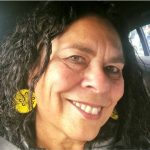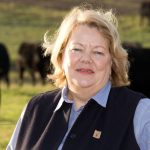‘Nameless, faceless, [women’s] stories become communal, not concerned with individuals, dates and deeds but with growth, community and connection.’
– Raylene Brown, Women at the Edge
WHGNE collaborated with The Wheeler Centre to plan and stage the first of a five-event series, Women at the Edge, in March 2020.
Victoria’s north-eastern regions are rich with dramatic scenery – from the majestic Alpine ranges to the storied banks of the Murray River. Indigenous people have lived in the area for tens of thousands of years.
The land is home, first and foremost, to their stories and lore. Since colonisation, this region has been the backdrop, too, to many myths and legends that are imprinted on the Australian national psyche – mostly goldrush stories of bushrangers and manhunts in the high country. Where are the women in all these stories?
To celebrate International Women’s Day, we’ll hear from local leaders, historians and experts as they delve into the history of the region and share often unacknowledged stories of the women who have shaped the recent and distant past. Join us at George Kerferd Hotel as we salute our foremothers in style.
Five remarkable women – Liz Conor, Robynne Nelson, Raylene Brown, Dr Jacqui Durrant and Alana Johnson – took to the stage at Women at the Edge: History and Beyond in Beechworth, sharing their insights, experience and knowledge of history with a 120–strong audience.
Each speaker brought a unique perspective to the discussion, but all emphasised the way mainstream history has been used as a tool of patriarchal culture. Women’s stories and experiences – though perhaps unwritten – have been strong threads that stitch together families, communities and cultures.
Listen to a podcast of the discussion here.
 Associate Professor Liz Conor in an ARC Future Fellow in History at La Trobe University on the ‘
Associate Professor Liz Conor in an ARC Future Fellow in History at La Trobe University on the ‘ Robynne Nelson is a proud Aboriginal woman of Yorta Yorta, Waveroo and Dja Dja Wurrung heritage. She has undertaken a broad range of consultancy projects across Victoria and NSW over the past 21 years including regional health plans, strategic planning, family services reviews, developing and reviewing service models, conference facilitation, developing policies and procedures and interagency partnership agreements, and writing Aboriginal Aged Care and Disability Policies for all Victorian Aboriginal Community Health Organisations. Robynne also completed a cross-border regional health plan for Albury Wodonga Aboriginal communities (2001) which resulted in the Albury Wodonga Aboriginal Health Service being established.
Robynne Nelson is a proud Aboriginal woman of Yorta Yorta, Waveroo and Dja Dja Wurrung heritage. She has undertaken a broad range of consultancy projects across Victoria and NSW over the past 21 years including regional health plans, strategic planning, family services reviews, developing and reviewing service models, conference facilitation, developing policies and procedures and interagency partnership agreements, and writing Aboriginal Aged Care and Disability Policies for all Victorian Aboriginal Community Health Organisations. Robynne also completed a cross-border regional health plan for Albury Wodonga Aboriginal communities (2001) which resulted in the Albury Wodonga Aboriginal Health Service being established. Raylene is a beekeeper’s daughter who has worked in agricultural research and extension across three states and a variety of agricultural industries. More recently she has been employed in Landcare. She now owns and manages a remnant woodland property in southern NSW under a conservation agreement. She has degrees in soil science and environmental management and is completing a Graduate Certificate of Wiradjuri Language, Culture and Heritage.
Raylene is a beekeeper’s daughter who has worked in agricultural research and extension across three states and a variety of agricultural industries. More recently she has been employed in Landcare. She now owns and manages a remnant woodland property in southern NSW under a conservation agreement. She has degrees in soil science and environmental management and is completing a Graduate Certificate of Wiradjuri Language, Culture and Heritage. Dr Jacqui Durrant is a historian and blogger specialising in early gold rush history, Aboriginal/white contact history and environmental history. Her first book, Fire on the Plateau — A History of Fire and its Management in Stanley, which concluded that climate change has dramatically increased the threat of bushfires in the local community, was published by the Stanley Athenaeum in Spring 2019. She lives in Beechworth, North East Victoria.
Dr Jacqui Durrant is a historian and blogger specialising in early gold rush history, Aboriginal/white contact history and environmental history. Her first book, Fire on the Plateau — A History of Fire and its Management in Stanley, which concluded that climate change has dramatically increased the threat of bushfires in the local community, was published by the Stanley Athenaeum in Spring 2019. She lives in Beechworth, North East Victoria. Alana is widely recognised for her work in rural development and gender equality. In January 2020 she was appointed a Member of the Order of Australia for her services to women.
Alana is widely recognised for her work in rural development and gender equality. In January 2020 she was appointed a Member of the Order of Australia for her services to women.